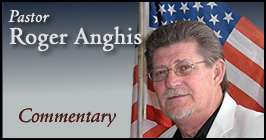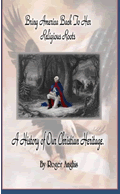POLITICAL SERMONS FROM PASTORS IN THE FOUNDING ERA
PART 15
By
Pastor Roger Anghis
November 10, 2013
NewsWithViews.com
A
Thanksgiving Sermon
December 15, 1774
By William Gordon
Pastor of the Third Church in Roxbury
This sermon was given at an event called the Boston Thursday Lecture. This event was founded by Reverend John Cotton in 1633. Even though its main purpose was a ministerial gathering the event was often used to discuss political and social issues. According to the Daily Free Press of the Boston University Faneuil Hall is still used today for discussions of social issues 380 years after its founding.
The British had simply removed the elected officials that the people had put in place and replaced them with those that were totally dedicated to the crown without regard as to the effects it would have on the people’s welfare. “The operation of the late unconstitutional acts of the British Parliament would not only deprive the colony of invaluable privileges, but introduce a train of evils little expected by the generality, and give the British ministry such an ascendency in all public affairs as would be to the last dangerous.”[1] (Emphasis mine)
As this act by the British to usurp the will of the people threatened the established freedoms that people had established for themselves they were not willing to just sit back and not try to regain their deserved freedoms. These concerns were voiced in letters from city and town leaders. We see in these letters that the main concern of the people was to maintain the ability of the people to govern themselves with ways to correct a grievance. “I would add, also, the clause in the regulating act respecting town meetings leaves it in the power of a governor to prevent them all at pleasure, those only excepted for the choice of town officers in March, and for the choice of representatives. Neither the most trifling nor the most important business can be legally transacted, so as to be binding upon the inhabitants, even in the most distant towns of the government, without leave first had and obtained of the governor, in writing, expressing such special business, though it should happen that if not done within less time than necessary for the obtaining of that leave it cannot be done at all. The townsmen can neither lay out a new road nor raise moneys for mending an old one, nor can they settle a minister, without obtaining the express written leave of the governor. Yea, they are forbid so much as to talk; for they are not to treat of any other matter at their March meeting except the election of their officers, nor at any other meeting except the business expressed in the leave given by the governor, or, in his absence, by the lieutenant-governor.
If this is not to establish slavery by legislative authority, I beg to know what is. The arbitrary mandates of the grand monarch, enjoining his slaves silence when state affairs are disagreeable to the public, will scarce be thought by many so great an attack upon the rights of mankind, as an attempt to perpetuate something of the like nature by a permanent law. Should the favorite of a governor have embezzled the town's money, bow shall a meeting be obtained to vote and order a prosecution against him? Should a candidate be reported as a warm friend to the liberties of the people, how shall leave be had for his being settled, though unanimously approved of and admired? Should an oppressed town be desirous of stating its grievances and praying a redress, how shall the inhabitants do it in a corporate capacity, should the commander-in-chief be prejudiced against them?”[2] (Emphasis mine)
These
are the issues that the pastors in the Founding era were willing to
address and speak biblical solutions to. The majority of the pastors
today would never even consider addressing these issues for fear of
offending someone. I understand that there are peoples from both sides
of the isle in churches but truth is truth and should be addressed with
vigor from the pulpit. I also understand that many will leave a church
but that is not because the
preacher isn’t presenting the Word of God properly, it is because
the preacher is presenting it properly. We are in the days that Paul
wrote to Timothy about when people would be more concerned about feeling
good than about doing what is right.
2
Timothy 4:2 Preach the word; be instant in season, out of season; reprove,
rebuke, exhort with all longsuffering and doctrine.
3. For the time will come when they will not endure
sound doctrine; but after their own lusts shall they heap to themselves
teachers, having itching ears;
4. And they shall turn away their ears from the truth,
and shall be turned unto fables.
5. But watch thou in all things, endure afflictions,
do the work of an evangelist, make full proof of thy ministry.[3]
We have to remember that most people can’t handle being told the truth if it contradicts their political views. I have a hard time understanding how a person who calls him/herself a Christian yet will vote for a candidate and a Party that is virtually in 100% opposition to the principles and laws of God. This is where the Democrat party of today is at in their support of homosexuality and their demand that all of America embrace what God has called and abomination. The same with abortion, which God calls the shedding of innocent blood. So many of today’s pastors have embraced these things that God has called sin simply because society is willing to accept it and they don’t want to offend anyone. Pastors are not called to follow, they are called to lead and the pastors of the Founding Era were the leaders.
In chapter 6 of my book, Defining American Exceptionalism, I made this statement concerning the Founding Era pastors: “It is very necessary that we discuss, and I believe in detail, the pastors of early America and especially during the time of the Founders. These were the men that fanned the flame of independence by preaching the principles of Christianity. Historian B.F. Morris stated: The ministers of the Revolution were, like their Puritan predecessors, bold and fearless in the cause of their country. No class of men contributed more to carry forward the Revolution and to achieve our independence than did the ministers. . . . [B]y their prayers, patriotic sermons, and services [they] rendered the highest assistance to the civil government, the army, and the country.[4] Alice Baldwin went one step further when she stated: The Constitutional Convention and the written Constitution were the children of the pulpit.[5]
These pastors were more than simple people who gave a cute sermon on Sunday mornings. They were the leaders of the community. They were the teachers. They carried so much influence in the community that the British labeled them The Black Regiment for the color of the robes that they wore.[6] The British even blamed these pastors for the war for independence[7] and probably rightfully so as all the rights declared in the Declaration of Independence had been preached from the pulpits of America from long before 1763.”[8]
| Subscribe to the NewsWithViews Daily News Alerts! |
I will reiterate my believe that the reason America is in the sad state that it is in is because the church is no longer standing firm on the Word of God and unless the church begins to show a willingness to do so, we will not see America return to its greatness. There are many churches that have begun to see the problem and have corrected it but we need many more to do so. 2 Chronicles 7:14 If my people, which are called by my name, shall humble themselves, and pray, and seek my face, and turn from their wicked ways; then will I hear from heaven, and will forgive their sin, and will heal their land.
Click here for part -----> 1, 2, 3, 4, 5, 6, 7, 8, 9, 10, 11, 12, 13, 14, 15, 16,
Footnotes:
1.
Pulpit of the American Revolution, John W. Thorton, The Federalist Papers
Project, (Gould and Lincoln, Boston), p. 203.
2.
Pulpit of the American Revolution, John W. Thorton, The Federalist Papers
Project, (Gould and Lincoln, Boston), p. 204.
3.
KJV.
4.
Benjamin Franklin Morris, Christian Life and Character of the Civil
Institutions of the United States (Philadelphia: George W. Childs, 1864),
pp. 334-335.
5.
Alice M. Baldwin, The New England Clergy and the American Revolution
(New York: Frederick Ungar Publishing Co., 1958), p. 134.
6.
Boston Gazette, December 7, 1772, article by "Israelite,"
and Boston Weekly Newsletter, January 11, 1776, article by Peter Oliver,
British official. See also Peter Oliver, Peter Oliver's Origin &
Progress of the American Rebellion, Douglas Adair and John A. Schutz,
editors (San Marino California: The Huntington Library, 1961), pp. 29,
41-45; Carl Bridenbaugh, Mitre and Sceptre (New York: Oxford University
Press, 1962), p. 334; and Alice M. Baldwin, The New England Clergy and
the American Revolution (New York: Frederick Ungar, 1958), pp. 98, 155.
7.
Alpheus Packard, "Nationality," Bibliotheca Sacra and American
Biblical Repository (London: Andover: Warren F. Draper, 1856), Vol.
XIII p.193, Article VI. See also Benjamin Franklin Morris, Christian
Life and Character of the Civil Institutions of the United States (Philadelphia:
George W. Childs, 1864), pp. 334-335.
8.
Alice M. Baldwin, The New England Clergy and the American Revolution
(New York: Frederick Ungar, 1958), p. 170.
� 2013 Roger Anghis - All Rights Reserved
Pastor Roger Anghis is the Founder of RestoreFreeSpeech.org, an organization designed to draw attention to the need of returning free speech rights to churches that was restricted in 1954.
President of The Damascus Project, TheDamascusProject.org, which has a stated purpose of teaching pastors and lay people the need of the churches involvement in the political arena and to teach the historical role of Christianity in the politics of the United States. Married-37 years, 3 children, three grandchildren.
Web site: RestoreFreeSpeech.org
E-Mail: editor@restorefreespeech.org














 Share
This Article
Share
This Article






